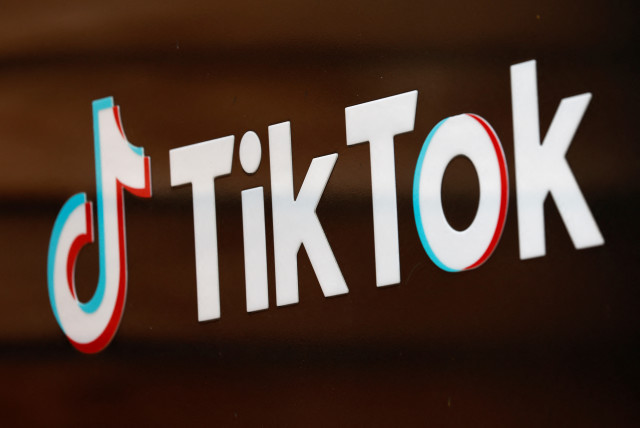How systemic bias against Jewish, Israeli content creators influenced me to leave TikTok - opinion

Campaigns that aimed at raising October 7 attack awareness were banned by TikTok, claiming they were “political,” while Palestinian well-paid ads related to the war had been approved.
On October 7, at 6:33 a.m., Gazan influencer Muhammad Smiri tweeted: “Hell is happening now where I live. Pray for us. Gaza.” At the time, not a single Israeli soldier had set foot in Gaza. Israelis in the southern district were still asleep in their beds, unaware of what awaited them at the hands of Hamas.
Social media is known by now to have immense power to shape public opinion. But a Palestinian account that foresaw the future and reported Gazan misery before the IDF even realized that a war just started, is a new phenomenon.
Could there be a well-organized network of mind control using one of the most powerful warfare tools humanity ever invented – social media? In the words of Iran’s Supreme Leader Ali Khamenei on X: “War is a media war. Whoever has the strongest media will be the most successful in achieving the goals they seek”.
I awoke early that morning from the avalanche of news reports on Hamas’s attack. Initially, I did not grasp that Israel is fighting a military war, with tanks and planes, while Hamas and its allies, entities that are hostile toward the democratic world, are fighting a different war – the war of public opinion.
Israel may very well win the war on the ground, and live to see a new day. But at the moment it seems as though the war of public opinion against democracy, and liberty as a whole, has tilted against America and its allies, with Israel being a case study for how the West intends to face the threat to its existence.
Although criticism toward TikTok and the way it shapes public opinion has been popular for years, I never felt, as a senior employee in the company, that the platform is being used as a tool in the war against me – as a Jew, a gay man, or a liberal who believes in democratic principles.
Furthermore, I initially felt proud of the company’s swift actions on October 7. While I and the company’s additional employees in Israel hid in bomb shelters from the thousands of missiles fired at Israel from Gaza, we also acted remarkably fast, sounding all the alarms and prompting TikTok to remove appalling content uploaded by Hamas and its supporters.
Sadly, my initial pride in the actions to remove pro-terrorism content quickly turned into troubling questions about the platform’s behavior during the war.
Bias in TikTok's content policy
Following October 7, I discovered a systematic bias in content policy and content moderation against Jews and against Israeli publishers and content creators. Campaigns that aimed at raising awareness were banned by TikTok, claiming they were “political,” while Palestinian well-paid ads related to the war had been approved although they included visuals of war scenes with building collapses and children in rubble.
Anti-American, anti-Israeli, and anti-Ukrainian disinformation superstar Jackson Hinkle spreads October 7 massacre denial videos on the platform, while pro-Israeli content creators reported that their factual videos are being banned or limited. To me, these examples, and many others, could only mean one thing: the platform is extremely biased. Policies are not implemented equally and reasonably.
FURTHERMORE, I discovered a group of TikTok employees who actively support convicted terrorists and Iranian-backed militias. Most, if not all, are in Trust and Safety teams, meaning they are in charge of content moderation and platform safety. They have celebrated those malicious entities on the company’s internal groups.
After other employees and I complained about this to the company, TikTok’s response was to remove all Jewish employees from those groups, so they can no longer complain about employees who use the internal work platform to celebrate terrorists or promote the Boycott, Divestment, and Sanctions movement.
Naively, I wrote an internal memo to the company management. I then made several attempts to get answers and proper responses to the claims – to no avail. Finally, after I had exhausted all remedies, I left the company.
The main victims, in my opinion, of the severe bias are Tiktok users in the United States and the rest of the democratic world. Today’s war on public opinion is fought on campuses, mainstream media, and mostly social networks, relying on mountains of lies, disinformation, and sophisticated systems of digital assets prepared for this very moment.
This widespread propaganda machine is poisoning the minds of students in elite universities. It inspires the removal of posters of Israeli hostages from billboards in New York, Berlin, and Paris. It eventually leads Jews in the United States to change their names on Uber in order to be able to find a ride. It is casting a heavy shadow on the security of Jews aiming to live peacefully and thrive in the land of opportunity.
I cannot blame TikTok for deliberately promoting antisemitic content nor for serving malicious powers. I personally have never witnessed the involvement of the Chinese government, or any other entity in the algorithm, as I was never exposed to the algorithm.
Yet, in my view, TikTok chose not to act firmly enough against the darkness of anti-truth that spreads through this platform and influences young people across the world. American users have been receiving what I saw as a distorted picture of reality. All this is due to a tsunami of disinformation and sometimes antisemitic and anti-American content.
The dark side of social media works as a net that catches a great number of individuals living in free democracies, only to shackle them through an intricate telescreen of lies. I knew that I would not be able to change the course of this company on my own. But in the end, I chose to say: not in my name.
Attempts by malicious powers to influence minds in democratic countries are not restricted to the war between Israel and Hamas. There have been attempts to tear our society apart by using fake accounts to intensify social tension in Western countries, especially before elections. There are networks that spread disinformation and conspiracy theories.
And then there are platforms that target the most vulnerable audiences for manipulations and drown them with content that encourages depression, anger, and various disorders.
Anti-Israeli campaigns and bias across platforms are just some examples. Today it is Israel, an ally of the US and a part of the Western world. Tomorrow – who knows? In such unstable times, some of us are forced to choose between a more pragmatic sense of stability, and standing up for truth and justice.
Even if it is hard – this is the time to fight back.
The writer was a senior employee at TikTok and resigned after exposing a systematic antisemitic and anti-Israeli bias. He now lectures around the world on the attempts by malicious powers to influence minds in democratic societies via social media.
Jerusalem Post Store
`; document.getElementById("linkPremium").innerHTML = cont; var divWithLink = document.getElementById("premium-link"); if (divWithLink !== null && divWithLink !== 'undefined') { divWithLink.style.border = "solid 1px #cb0f3e"; divWithLink.style.textAlign = "center"; divWithLink.style.marginBottom = "15px"; divWithLink.style.marginTop = "15px"; divWithLink.style.width = "100%"; divWithLink.style.backgroundColor = "#122952"; divWithLink.style.color = "#ffffff"; divWithLink.style.lineHeight = "1.5"; } } (function (v, i) { });

